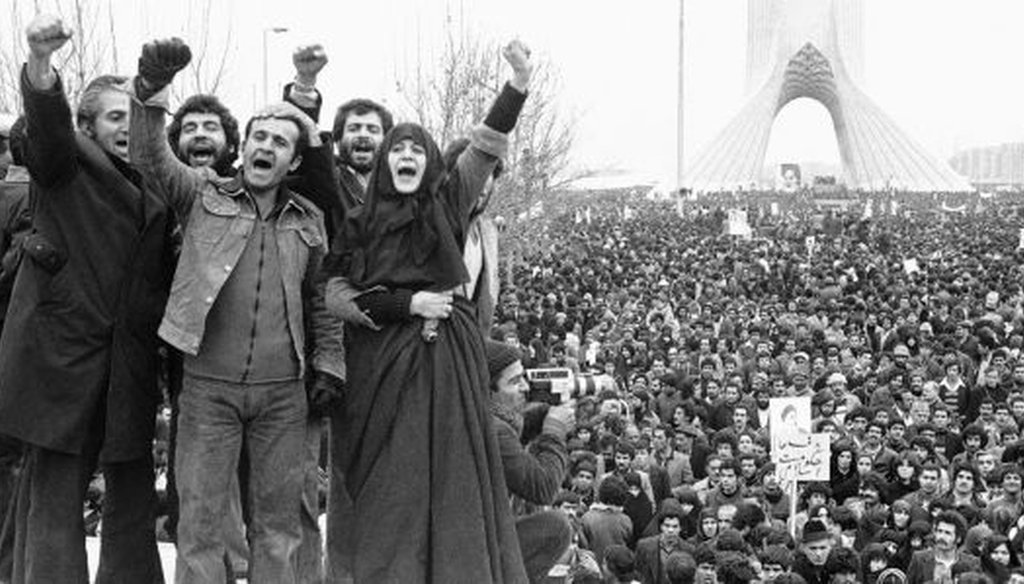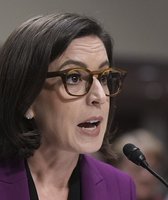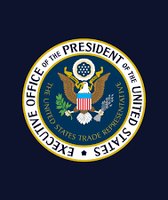Stand up for the facts!
Our only agenda is to publish the truth so you can be an informed participant in democracy.
We need your help.
I would like to contribute

A scene from the Iranian Revolution in Shahyad Square in Tehran. (Wikimedia commons)
Donald Trump’s call to bar Muslims at least temporarily from entering the United States sparked a backlash, including from fellow Republican presidential candidates who said it was unconstitutional and unwarranted.
But some who support Trump’s proposal have taken to social media to argue that his idea is pretty much the same thing that a recent Democratic president -- Jimmy Carter -- did while he was in office.
The argument surfaced initially at the conservative website FrontPage Mag in a post written by Daniel Greenfield before spreading widely. Greenfield’s post looks at some of the actions Carter took in the wake of the Iran hostage crisis, in which more than 60 American embassy personnel in Tehran were held captive by militants for 444 days between 1979 and 1981.
Greenfield begins his article sarcastically, writing, "Trump is a monster, a madman and a vile racist. He's just like Hitler. Or Jimmy Carter. During the Iranian hostage crisis, Carter issued a number of orders to put pressure on Iran. Among these, Iranians were banned from entering the United States unless they oppose the Shiite Islamist regime or had a medical emergency."
He cites two specific actions. One was an order for Iranian students to report to immigration offices in order to determine if they had violated the terms of their visa; if they had, they would be deported. The second was an order to end all future visas for Iranians and to stop issuing most new visas
Sign up for PolitiFact texts
Documentary evidence and interviews with experts say the events under Carter happened -- but how much support they provide for Trump’s proposal is a lot less certain.
Because it’s difficult to give a Truth-O-Meter rating to what amounts to an analogy, we aren’t putting this claim to the scale. But we thought it was a worth a thorough analysis, because experts told us the two cases aren’t equivalent.
What did Carter do?
On the question of student visas, Carter’s attorney general, Benjamin Civiletti, on Nov. 13, 1979, ordered all Iranians with student visas to report to U.S. immigration officials by Dec. 14 or else face possible deportation, according to a New York Times account. Civiletti was acting on a Nov. 10 order from Carter.
Federal judge Joyce Hens Green initially ruled the order unconstitutional on Dec. 12, 1979, but her ruling was later reversed on appeal. On Sept. 22, 1980, the Times, citing an Immigration and Naturalization Service spokesman, reported that by that date, nearly 60,000 students had registered as required, about 430 had been deported and 5,000 had left voluntarily.
As for visas for Iranians other than students, on April 7, 1980, about five months into the hostage crisis, Carter went to the White House briefing room to announce a series of sanctions against Iran.
In addition to announcing an end to diplomatic relations with Iran, freezes of Iranian assets and economic sanctions, Carter ordered administration officials to "invalidate all visas issued to Iranian citizens for future entry into the United States, effective today. We will not reissue visas, nor will we issue new visas, except for compelling and proven humanitarian reasons or where the national interest of our own country requires. This directive will be interpreted very strictly."
So the contention that Carter issued a pair of orders that effectively blocked a broad category of foreigners from entry into the United States, is broadly accurate, though the discussion on the Internet sometimes glosses over the humanitarian exclusions, which according to news accounts at the time were taken seriously -- and which contrast sharply with Trump’s opposition to accepting Syrian refugees.
How similar are the two cases?
When we interviewed an ideologically diverse group of specialists on Iran, immigration, and constitutional law, most saw significant differences between the two examples.
• Carter acted against Iranian nationals, not an entire religion.
"The difference is that Iranians were citizens of, and owed allegiance to, a country that was acting against the United States," said Kermit Roosevelt, a law professor at the University of Pennsylvania. "The class of ‘all Muslims’ has no similar connection to ISIS or terrorists. That makes the analogy seriously flawed."
David Houghton, a senior lecturer in defense studies at King’s College of London and author of U.S. Foreign Policy and the Iran Hostage Crisis, agreed, saying only Carter’s actions can be labeled "proportionate." Trump "appears to want to bar all Muslims, extremists, moderates and anything else, merely because they identify with a religious group which is actually quite diverse," Houghton said.
Michael M. Gunter, a political scientist at Tennessee Technological University and author of the forthcoming book From Nowhere: The Kurds in Syria, concurs. "Trump is throwing out the baby with the bathwater by taking action against all members of a particular religion, regardless of whether or not such members belong to states hostile to the United States," Gunter said.
The distinction between nationality and religion is significant, some legal scholars added, since the Constitution provides a bigger barrier to Trump’s religion-based approach than Carter’s nationality-based approach.
"I doubt that courts would read that law to authorize the president to remove non-citizens based on religion," said Ilya Shapiro, a senior fellow in constitutional studies at the libertarian Cato Institute. "Targets of such an executive policy would likely be successful in lawsuits raising First Amendment (free exercise) and Fifth Amendment (due process) rights."
• Carter was ratcheting up diplomatic pressure in a fairly traditional process of crisis management.
Experts said that Carter’s actions are best understood in the context of a traditional conflict with a nation-state, something that doesn’t exist in the environment now shaping Trump’s proposal.
"Carter acted after the Iranian government accepted and defended the action by militants who stormed our embassy in Tehran and took our diplomats hostage," said David Martin, a University of Virginia law professor who has written extensively about immigration law. "It was a classic, major, state-to-state confrontation, based on a flagrant violation of diplomatic immunity. Carter invoked a host of counter-measures long recognized as appropriate under international law."
David Farber, a University of Kansas historian and author of Taken Hostage: The Iranian Hostage Crisis and America's First Encounter with Radical Islam, agreed, saying, "Carter intended to show the Iranian government that their actions in support of the hostage takers would have consequences. Visa restrictions were just one of the many measures President Carter deployed to pressure the Iranian government."
The changing geopolitical environment
The biggest area of agreement we found between Greenfield and experts is that Carter was responding to a crisis involving a sovereign state, whereas today’s threats come from non-state actors such as ISIS or al-Qaida. Today, non-state threats are growing in severity, making the kinds of tactics Carter used moot.
Martin sees some merit in this argument. "I don't deny that some legal doctrines will change -- and are already changing -- based on the very different types of conflicts we now face against non-state actors," Martin said. "And maybe someday, in a deeper emergency, a president will find it necessary to adopt some other type of broad categorical exclusions on immigration from a particular region."
Still, he added, "Trump's action can't possibly find justification based on such an analogy. Barring all Muslims uses a ridiculously overbroad proxy when viewed either as protecting against danger or as creating a plausible bargaining chip that could get the other side to cease its violations."
Our Sources
FrontPage Mag, "Carter Banned Iranians from Coming to US During Hostage Crisis," Dec. 8, 2015
Jimmy Carter, "Sanctions Against Iran Remarks Announcing U.S. Actions," April 7, 1980
History.com, "Iran Hostage Crisis," accessed Dec. 10, 2015
Washington Post, "Carter's Visa Crackdown Won't Hurt Immediately," April 9, 1980
New York Times, article by Robert Pear, Sept. 22, 1980 (accessed via Nexis)
New York Times, article by Graham Hovey, Dec. 12, 1979 (accessed via Nexis)
FlaglerLive.com, "Fact-Check: When Jimmy Carter Threatened Iranian Students With Deportation," Dec. 9, 2015
Snopes.com, "Jimmy Starter," Dec. 9, 2015
Email interview with Mark Krikorian, executive director of the Center for Immigration Studies, Dec. 9, 2015
Email interview with Kermit Roosevelt, law professor at the University of Pennsylvania, Dec. 9, 2015
Email interview with David Houghton, senior lecturer in defense studies at King’s College of London and author of U.S. Foreign Policy and the Iran Hostage Crisis, Dec. 9, 2015
Email interview with Michael M. Gunter, political scientist at Tennessee Technological University and author of the forthcoming book From Nowhere: The Kurds in Syria, Dec. 9, 2015
Email interview with John Limbert, historian and political scientist at the U.S. Naval Academy and author of Iran: At War with History, Dec. 9, 2015
Email interview with David Farber, historian at the University of Kansas and author of Taken Hostage: The Iranian Hostage Crisis and America's First Encounter with Radical Islam, Dec. 9, 2015
Email interview with Ilya Shapiro, senior fellow in constitutional studies at the Cato Institute, Dec. 9, 2015
Email interview with Stephen Kinzer, senior fellow in international and public affairs at Brown University and author of the book, Reset: Iran, Turkey, and America’s Future, Dec. 9, 2015
Email interview with David Martin, University of Virginia law professor, Dec. 9, 2015
Email interview with Daniel Greenfield, Shillman Fellow in Journalism at FrontPage Mag, Dec. 9, 2015


































